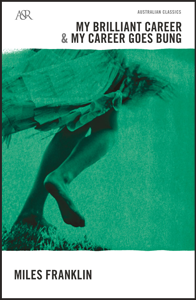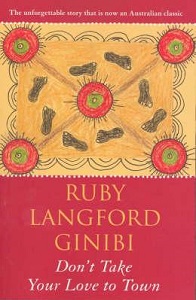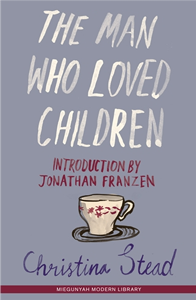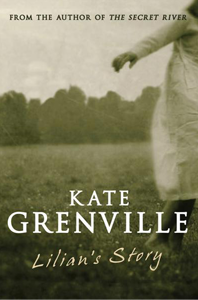International Women’s Day takes place every year on 8 March. It is a day for promoting the empowerment of women and recognising that gender equality has not yet been achieved. This gender disparity extends into the literary world. Women win less literary prizes than their male counterparts and their work is featured less in the literary sections of newspapers and magazines. Even as fictional characters, women do not fare as well as men.
The yearly Stella Count shows us there is still a fair way to go in achieving a balance between female and male writers. The reality is that, for one reason or another, works by male authors are attributed a higher cultural value than the works of women.
To commemorate 8 March we have chosen 8 books on the Reading Australia list that are written by, for and about women.
1. My Brilliant Career
Stella Maria Sarah Miles Franklin is the iconic author whose name inspired not one, but two, major Australian literary awards: the Miles Franklin, the most prestigious literary award in the country, and the Stella Prize, an award dedicated to celebrating Australian female writers and addressing the lack of recognition female authors receive.
My Brilliant Career is about a young woman who defies the gender constraints of her time by rejecting the traditional path of a woman (marriage or a governess) and instead chooses to follow her dreams of being a writer.
2. Don’t Take Your Love to Town
Don’t Take Your Love to Town, winner of the 1988 Australian Human Rights Literary Award, is a highly-respected Indigenous memoir. It was written by Aboriginal author, activist and historian, Ruby Langford Ginibi, and is the story of her life as an Aboriginal woman. Hers is a life endured – born on a mission and abandoned by her mother at age six, she underwent four difficult relationships and raised nine children, almost single-handedly. She sufferred the deaths of four of her children and overcame an alcohol addiction and a lifetime of racism. She writes about the struggles faced by Aboriginal communities, in particular their high representation in prisons.
3. The Man Who Loved Children
This novel tells the story of a young girl living in a dysfunctional family who struggles to escape her father’s tiring and overbearing masculinity and narcissism. When it was first published in 1940, it was largely ignored by the public and literary world. It wasn’t until its 1965 reissue, the era of feminisim’s second wave, that it found some popularity. Christina Stead, often cited by other writers to be one of the greatest Australian authors, chose not identify with the feminist movement. Nonetheless, her novel has widely been interpreted as being about a young girl escaping from the control of her patriarchal family.
4. Faith Singer
Faith Singer is a middle-aged, whiskey-drinking, foul-mouthed retired rock star who lives in Kings Cross, the place where society’s outcasts come together. She has a passion that is commanding and loving and dangerous all at once, and she defends those she loves with an animalistic fierceness. Female love and friendship, grief and tenderness, traditionally traits aligned with the “weaker” sex, are the very things that make the characters of this novel powerful. At the heart of this story are Faith’s feminist values that persist in the face of the exploitative patriarchy.
5. Bush Studies
This short story collection, published in 1902, focusses on the experiences of women living in the Australian bush. Barbara Baynton, inspired by her own experiences, dismantles the romanticised image of life in the bush, instead depicting it as a harsh place where female suffering is commonplace. The women in these stories are isolated, lonely and lacking in female friendship. They live through the tragedies and terrors of the bush, and survive the whims and cruelties of men.
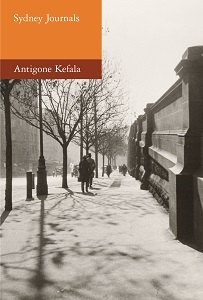 6. Sydney Journals: Reflections 1970–2000
6. Sydney Journals: Reflections 1970–2000
Sydney Journals is a collection of diary entries written by poet Antigone Kefala over a period of 30 years during which she lived in Sydney. Born in Romania, Antigone lived in Greece and New Zealand with her family before settling in Sydney. Her poetry is interested in introspection and in the dream world. As a migrant who speaks several languages and learnt English only when she arrived in New Zealand, she is aware that language and all its meaning is a construct, limited by geography and culture.
7. Mother I’m Rooted
In 1970, a young poet and activist named Kate Jennings gave a speech at a Vietnam Moratorium that kick-started the second wave of feminism in Australia. Jennings went on to edit Mother I’m Rooted, an anthology of poetry written by women. This anthology gives voice to the whole spectrum of female experience. Married, single, housewives, professionals, mothers, lesbians, heterosexuals – they are all represented and they demand that their choices, lifestyles, feelings (including the unfeminine anger, despair, bitterness) are valid whether they follow the traditional path or not.
8. Lilian’s Story
Lilian Singer was born in 1901, a time when the education of women was considered unnecessary, even dangerous. Intelligent, resilient, and with a burning desire for independence, Lilian rejects the life deemed “acceptable” by society. Instead, she becomes an eccentric – energetic, happy and true to herself. This story is all the more captivating for being inspired by the real-life Bea Miles, a familiar figure to Sydney-dwellers, who lived on the streets and recited Shakespeare in exchange for money.


